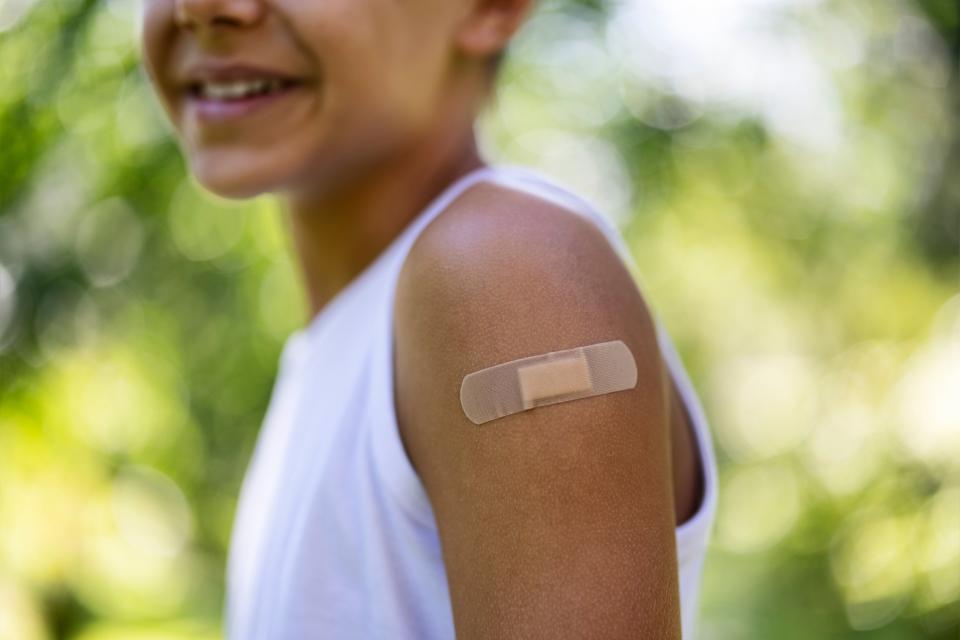Can I Get A COVID Booster Shot?

The director of the Centers for Disease Control and Prevention endorsed the Pfizer COVID vaccine booster for younger at-risk workers on Thursday, wrapping up a week of regulatory squabbling over who should be eligible for the extra dose and when.
CDC Director Dr. Rochelle Walensky ultimately broke with a CDC advisory panel, which earlier in the day had recommended the Pfizer booster be available Americans 65 and older and people with underlying medical conditions, but not those in high-risk occupations. The Food and Drug Administration had signed off on additional doses for all three of those categories just one day prior.
“You’d have to work really hard to mess this up this badly and engender this much confusion,” tweeted Eric Topol, a professor of molecular medicine at Scripps Research in California. Topol went on to praise the CDC director for ultimately aligning her decision with the FDA’s.
The back-and-forth between the various authorities has understandably caused a lot of confusion for people on whether they can get a booster. Curious if you qualify right now? Here’s what you need to know:
You qualify for a booster if you got the Pfizer vaccine and you’re 65 and up, have an underlying medical condition, or work in a high-risk field
The Biden administration said back in August that it hoped to roll out booster doses to all fully vaccinated Americans starting this fall, pending regulatory approval. But ultimately, both the FDA and CDC decided boosters for everyone were unnecessary.
The FDA weighed in with its recommendation first, announcing this week that Americans 65 and up, those with underlying health conditions, and people who work in high-risk jobs should be eligible for a booster dose at least six months after their second Pfizer shot.
Then a CDC panel called the Advisory Committee on Immunization Practices weighed in. The group broke with the FDA on the question of whether people working in high-risk jobs ― including health care workers and teachers ― should qualify. Many panel members argued that boosters for those groups weren’t necessary, and that the group was too broad. “We might as well give it to everybody,” one committee member said.
Ultimately, the final say went to Walensky. After midnight on Thursday, the CDC published its official recommendation, which differed from the ACIP committee and included high-risk workers in its eligibility categories.
So after all of that back-and-forth, here’s where things stand now:
If you’re 65 or older, or someone who lives in a long-term care setting, you should receive a Pfizer booster.
If you’re 50-64 with an underlying medical condition, you should receive a Pfizer booster.
If you’re 18-49 with an underlying condition, you may receive a Pfizer booster.
And if you’re 18-64 working a job that puts you at increased risk of exposure and transmission, you may receive a Pfizer booster.
What if I didn’t get the Pfizer vaccine?
Sit tight. Federal regulators are still evaluating whether boosters are needed for those who received the Moderna vaccine. Johnson & Johnson has not yet submitted an application for a booster to the FDA.
Some CDC advisors expressed concern about recommending Pfizer boosters before weighing in on the other vaccines, saying it could be confusing and alarming to people who received different shots.
“I just don’t understand how, later this afternoon, we can say to people 65 and older, ‘You’re at risk for severe disease and death, but only half of you can protect yourselves right now,’” Dr. Sarah Long, a pediatrician and infectious diseases expert at Drexel University College of Medicine in Pennsylvania, said during the panel debate.
Still, all three vaccines continue to hold up well, and experts emphasize that breakthrough infections are rare (although the CDC no longer tracks those that don’t result in a hospitalization or death). The vast majority of people who end up in the hospital or who die from COVID-19 are unvaccinated.
There’s also emerging evidence that Moderna may provide the highest level of protection against severe outcomes over time.
Here are the jobs and medical conditions that qualify you for a booster
The CDC has a complete alphabetical list of certain health conditions that qualify you for a Pfizer booster shot, although the group could update those in the coming days and weeks. For now, the list includes people with diabetes, who are pregnant, who are overweight or obese, and those who smoke.
That’s in addition to people who are immune compromised (like those undergoing cancer treatments or living with HIV), who have been eligible for a third dose for more than a month now.
The current list of high-risk occupations includes “health care workers, teachers and day care staff, grocery workers and those in homeless shelters or prisons, among others,” the FDA commissioner said this week. It’s unclear what might fall into that “among others” group at this point.
As was the case with the initial doses, people will not be asked to provide proof of eligibility, and so-called booster banditry is an ongoing concern.
Boosters could start rolling out ASAP
Now that both the FDA and CDC have weighed in, the White House could start rolling out boosters almost immediately.
And since a booster is just a third dose of the original Pfizer vaccine, experts have said there won’t be the same kind of supply issues that popped up when vaccines were first available, since pharmacies, doctors offices and mass vaccination sites already have shots in stock, and a smaller segment of the population is eligible.
Experts are still learning about COVID-19. The information in this story is what was known or available as of publication, but guidance can change as scientists discover more about the virus. Please check the Centers for Disease Control and Prevention for the most updated recommendations.
This article originally appeared on HuffPost and has been updated.

 Yahoo Finance
Yahoo Finance 


